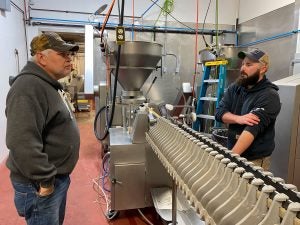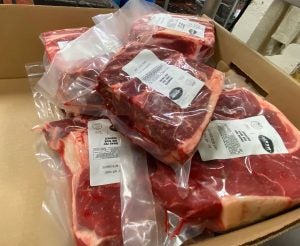This submitted article is part of Wisconsin Farmers Union’s ongoing series focused on rural infrastructure investment and is produced thought the Rural Voices project.
CADOTT, Wis. — Back in 2003, when Wayne Lautsbaugh purchased a small, defunct butcher shop north of Cadott, appointments to slaughter cattle and pigs at his business were few and far between.
“When I first opened my doors, summer was dead,” Lautsbaugh recalled as he gave a tour in August of the Crescent Meats butcher shop he owns. “There would be times of the year when there were hardly any animals coming in at all. Small plants like us were going out of business.”
That certainly isn’t the case today. Meat processing plants across Wisconsin and elsewhere in the U.S. can’t keep up with demand. Many plant owners say they have plans to expand, and many report waiting lists of a year or more before they can get more animals in to be processed.
Lautsbaugh said he is experiencing the same business crunch. As some of his 16 employees busily cut up meat and hauled packages on a recent morning, Lautsbaugh described how he is booked through the end of next year and can’t take new appointments until after that date. Since the COVID-19 pandemic began, he said he turns down about 20 customers each week who are seeking to have animals butchered
at his facility.
“I can’t take on any new customers,” Lautsbaugh said. “There is no down time here anymore. We’re busy all year long.”

Other meat processors describe similar demand for processing animals exceeding their ability to do so. Many say they are scheduled through the rest of this year and part-way into 2023. Some, like Lautsbaugh, don’t have openings until 2024.
Farmers say they often face waits of at least one year to have their animals slaughtered and processed. Some say they have to contact multiple processors before finding one willing to take them on as a customer. Sometimes that means long travel times to haul their animals to processing locations.
When the pandemic began two years ago, Stephanie Schneider learned that her usual meat processor was too busy to take her animals, raised on her Together Farm south of Mondovi, because of overwhelming demand. She eventually found another processor but lost customers for a time because of changes in how the meat was processed and labeling differences.
Schneider eventually was able to resume service with her original processor and gained back customers, she said. But many farmers continue to struggle finding a place to have their animals processed, she said. She makes appointments to bring her animals to her processor one year ahead of time.
“Finding a place to have your animals processed is a big challenge right now,” Schneider said. “I feel really lucky to have a processor I really like, but many farmers aren’t in that situation.”
Meat processing expansion efforts
A meat processing shortage in Wisconsin and elsewhere has been present for some years, and it was exacerbated by the pandemic. When meatpacking workers at large plants contracted the COVID-19 virus, output from those plants was reduced significantly, straining a sector that already lacked enough processors even before the pandemic.
That, in turn, created overwhelming demand for the smaller meat processors and revealed the shortage of those processors. For a time, the amount of meat available at groceries was reduced, and already long waits to butcher farmers’ animals grew even longer.

Gov. Tony Evers’ administration has worked to address the meat processing shortage in Wisconsin. Among those efforts are the $10 million Meat and Poultry Supply Chain Resiliency Grant Program made available through American Rescue Plan Act (ARPA) funding and the Meat Talent Development Program, funded by $5 million in ARPA money. An additional $200,000 to help meat processors across Wisconsin expand their operations was approved as part of the 2021-23 state budget.
Four meat processing companies — Cargill, JBS, Tyson Foods, and National Beef Packing — control more than 80 percent of the beef market in the U.S. When those processors experienced processing disruptions during the pandemic, the resulting meat shortage at groceries revealed the need for more, smaller meat processors.
Wisconsin Farmers Union and other organizations have advocated for diversifying the meat processing sector, a move that provides jobs for more processors while shortening wait times to butcher animals, Wisconsin Department of Agriculture, Trade and Consumer Protection Secretary Randy Romanski said.
“We have a real need to expand our meat processing capacity, and enabling more processors to enter the market not only meets an important need but can add to the economies of our rural communities,” Romanski said.
Applications for expansions by meat processors were so numerous, he said, that the state increased the maximum $50,000 grant limit to $150,000 per processor seeking to expand. In addition to money needed for growing their operations, meat processors said they need more workers, Romanski said. The Meat Talent Development Program will address that, he said, by providing training through Wisconsin technical colleges.
“There is a lot happening right now to help address the meat processing shortage,” Romanski said, “and we plan to have even more efforts in the future. We recognize the importance of this issue.”
To provide more opportunities for farmers to sell their meat and to get food to people in need during the pandemic, DATCP partnered food distribution agencies like Feeding Wisconsin and Hunger Task Force. Those agencies in turn began using ARPA funding they received to purchase more food, including meat, from small- and medium-size farms.
“We are making an intentional effort to purchase food from smaller farmers whenever we can,” said Stephanie Jung Dorfman, executive director of Feeding Wisconsin. “We are still certainly partnering with commodity associations and big producers, but we are paying market prices to smaller farmers, and that is helping them while also getting high-quality meat and other foods to consumers regionally.”
Hopeful for the future
Lautsbaugh was among recipients earlier this year of a $50,000 state grant to expand his processing plant. With the grant maximum being raised to $150,000, he has applied for another $100,000 and is hopeful about receiving that funding too.
That money is needed to help pay for his expansion that will cost an estimated $7.5 million to $8 million and expand Crescent Meats’ processing capacity from 3,000 to 7,000 animals annually. With the expansion, the company’s processing plant would grow from 12,000 square feet to 32,000. Expansion is possible in large part, Lautsbaugh said, because of so many more farmers marketing their meat directly to consumers instead of selling to large buyers.
“That’s been a big change from when I first started in this business,” he said of direct sales. “There is a lot more awareness about where meat comes from, and more people are willing to pay for what they want.”

While demand for his services are high now, Lautsbaugh worries that could lessen as the economy progresses past the pandemic. He also is concerned about finding enough workers, noting he needs 20 to keep up with demand now but has only 16.
Schneider said the meat processor she takes her animals to also plans to expand to meet demand. But, like Lautsbaugh, that processor is scrambling to find enough employees, Schneider said.
Meat processing “is another industry that is struggling to find enough workers,” she said.
Despite challenges, Lautsbaugh is heartened by the significant uptick in meat processing business in recent years. He said he hopes that will continue as more people are concerned about eating healthy food.
Even before building an addition to his business, Lautsbaugh is growing it through ICON, a meat brand specializing in meats such as elk, bison, and venison that he is part owner of. ICON products are sold in 30 U.S. states, he said.
Meat processing is a family affair for Lautsbaugh. His wife Stacey oversees the company’s finances, and his son Vance and daughter Samantha are involved in the business. In fact, if it weren’t for them, Lautsbaugh said he wouldn’t be expanding his meat processing plant.
“Operating this business was a struggle for many years,” he said. “But we worked hard to make a good product and build relationships … There are still struggles. This is a hard business. Not everyone wants to do this kind of work. But to wake up every day and work with your entire family is a blessing.”
Writer Julian Emerson lives in the Chippewa Valley and is Communications Specialist for Wisconsin Farmers Union. He can be reached at jemerson@wisconsinfarmersunion.com.


